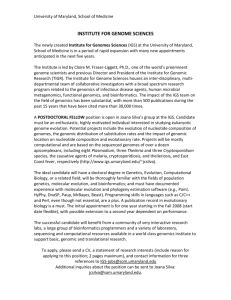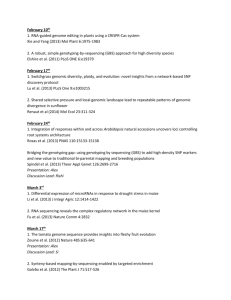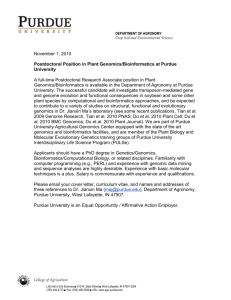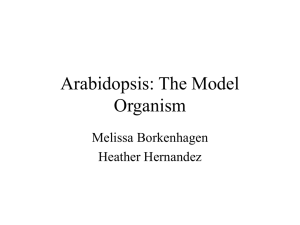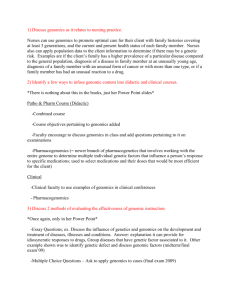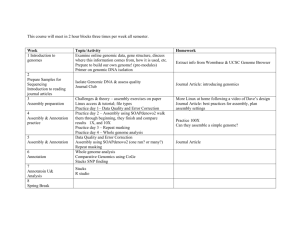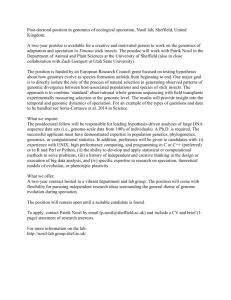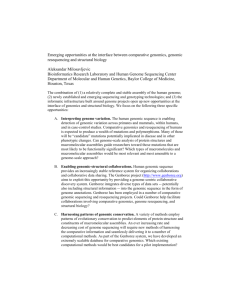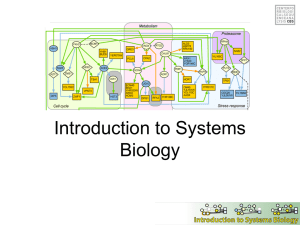NP_Symposium_proposal_Final - New-Phytologist
advertisement
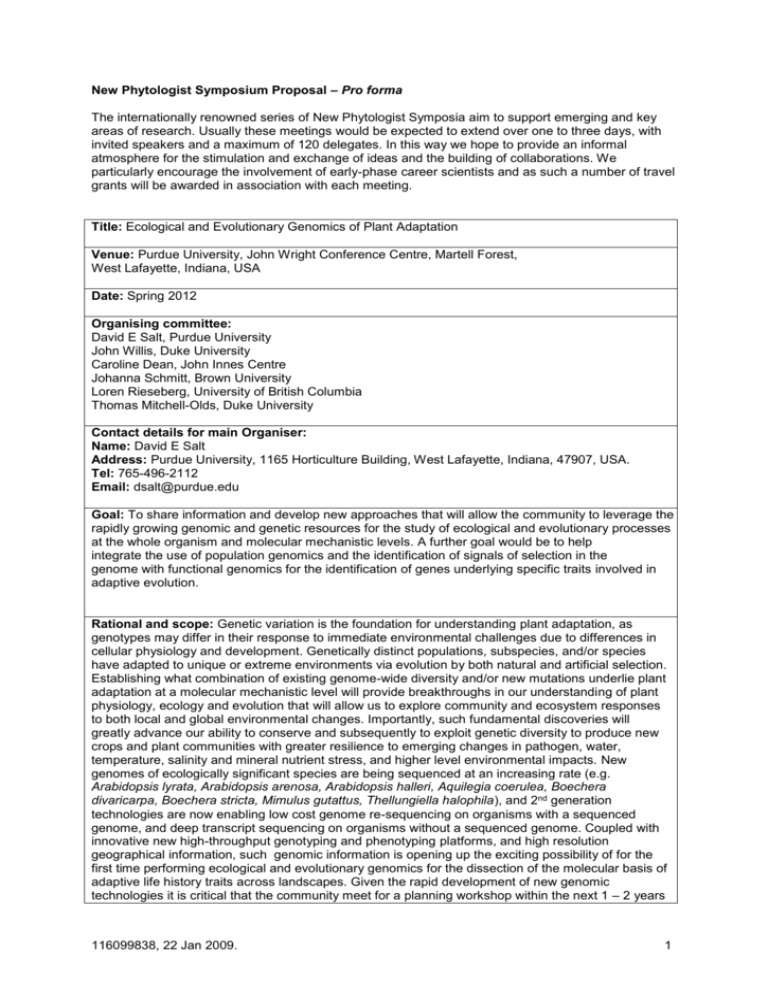
New Phytologist Symposium Proposal – Pro forma The internationally renowned series of New Phytologist Symposia aim to support emerging and key areas of research. Usually these meetings would be expected to extend over one to three days, with invited speakers and a maximum of 120 delegates. In this way we hope to provide an informal atmosphere for the stimulation and exchange of ideas and the building of collaborations. We particularly encourage the involvement of early-phase career scientists and as such a number of travel grants will be awarded in association with each meeting. Title: Ecological and Evolutionary Genomics of Plant Adaptation Venue: Purdue University, John Wright Conference Centre, Martell Forest, West Lafayette, Indiana, USA Date: Spring 2012 Organising committee: David E Salt, Purdue University John Willis, Duke University Caroline Dean, John Innes Centre Johanna Schmitt, Brown University Loren Rieseberg, University of British Columbia Thomas Mitchell-Olds, Duke University Contact details for main Organiser: Name: David E Salt Address: Purdue University, 1165 Horticulture Building, West Lafayette, Indiana, 47907, USA. Tel: 765-496-2112 Email: dsalt@purdue.edu Goal: To share information and develop new approaches that will allow the community to leverage the rapidly growing genomic and genetic resources for the study of ecological and evolutionary processes at the whole organism and molecular mechanistic levels. A further goal would be to help integrate the use of population genomics and the identification of signals of selection in the genome with functional genomics for the identification of genes underlying specific traits involved in adaptive evolution. Rational and scope: Genetic variation is the foundation for understanding plant adaptation, as genotypes may differ in their response to immediate environmental challenges due to differences in cellular physiology and development. Genetically distinct populations, subspecies, and/or species have adapted to unique or extreme environments via evolution by both natural and artificial selection. Establishing what combination of existing genome-wide diversity and/or new mutations underlie plant adaptation at a molecular mechanistic level will provide breakthroughs in our understanding of plant physiology, ecology and evolution that will allow us to explore community and ecosystem responses to both local and global environmental changes. Importantly, such fundamental discoveries will greatly advance our ability to conserve and subsequently to exploit genetic diversity to produce new crops and plant communities with greater resilience to emerging changes in pathogen, water, temperature, salinity and mineral nutrient stress, and higher level environmental impacts. New genomes of ecologically significant species are being sequenced at an increasing rate (e.g. Arabidopsis lyrata, Arabidopsis arenosa, Arabidopsis halleri, Aquilegia coerulea, Boechera divaricarpa, Boechera stricta, Mimulus gutattus, Thellungiella halophila), and 2nd generation technologies are now enabling low cost genome re-sequencing on organisms with a sequenced genome, and deep transcript sequencing on organisms without a sequenced genome. Coupled with innovative new high-throughput genotyping and phenotyping platforms, and high resolution geographical information, such genomic information is opening up the exciting possibility of for the first time performing ecological and evolutionary genomics for the dissection of the molecular basis of adaptive life history traits across landscapes. Given the rapid development of new genomic technologies it is critical that the community meet for a planning workshop within the next 1 – 2 years 116099838, 22 Jan 2009. 1 in order to both maximize the efficacy with which the community utilizes these technological breakthroughs, and also optimize the development of new rate limiting resources. Symposium format: Small meeting (workshop). Day 1 scientific talks and information exchange with a focus on discoveries enabled by genomic-scale methodologies. Day 2 community planning meeting to define experimental workflows required for the utilization of genomic-scale data, and identification of current and future rate limiting resources. The workshop attendees will prepare a paper detailing the way forward for ecological and evolutionary genomics of plant adaptation. Draft programme: Potential workshop attendees Amy Angert (Colorado State) Johanna Schmitt (Brown) Caroline Dean (JIC) David Neale (UC Davis) David E Salt (Purdue) Doug Schemske (Michigan State) Graham Coop (UC Davis) John Kelly (U. Kansas) John Willis (Duke) John McKay (Colorado State) Julie Etterson (Minnesota) Justin Borevitz (U. Chicago) Kirsten Bomblies (Harvard) Leonie Moyle (Indiana U.) Loren Reiseberg (UBC) Magnus Nordborg (GMI) Monica Geber (Cornell) Outi Savolainen (U. Oulu) Sally Aitken (UBC) Sergey Nuzhdin (USC) Sharon Strauss (UC Davis) Tom Juenger (UT Austin) Tom Mitchell-Olds (Duke) Xavier Morin (CNRS) Beneficial outcomes: The community will both directly benefit from the exchange of scientific information, and also accrue longer term benefit from the development of approaches that maximize existing and developing genomic technologies and information. Furthermore, a community driven effort to develop needed rate limiting resources will lay the foundation for more rapid scientific progress for the whole community in the coming years as we enter into 3rd and 4th generation genomic technologies. Approximate cost: We propose to invite 15 – 20 key scientists from the community and cover their expenses at approx. $1000 per attendee. Additional comments: Note 1 Format can be varied according to the needs of each symposium. However, we have found that the following two work well: 116099838, 22 Jan 2009. 2 1. Small meetings (£12k). A 1–2 day meeting in more of a workshop style, with 10–12 speakers and up to 75 delegates. Posters optional. (e.g. 15th NPS: http://www.newphytologist.org/networks/default.htm) 2. Larger meetings (£22k). A 2–3 day meeting that will generally include 20 talks, breakout discussions, posters and 100–120 participants. (e.g. 16th NPS: http://www.newphytologist.org/fungalgenomics/default.htm) Note 2 The above boxes may be expanded to fit your text. Procedure Proposals are considered on a yearly basis and should be submitted by the end of February to the Managing Editor (address below) as a Word document. These will then be considered by the board of Editors and recommendations taken forward to the board of Trustees for the final decision. Decisions will be notified by early June. You are welcome to contact the Managing Editor with preliminary enquiries at any time of the year. Dr Holly Slater Managing Editor, New Phytologist New Phytologist Central Office, Bailrigg House, Lancaster University, Lancaster, LA1 4YE, UK Tel + 44 1524 594387; Fax + 44 1524 594696; Email h.slater@lancaster.ac.uk 116099838, 22 Jan 2009. 3
